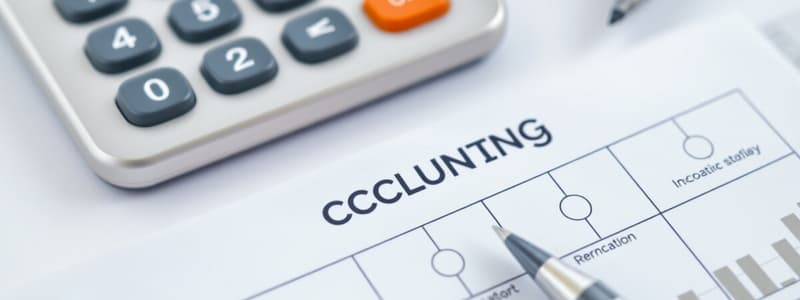Podcast
Questions and Answers
What is the first step in the accounting cycle?
What is the first step in the accounting cycle?
Use source documents to identify accounts affected by external transactions.
What is the second step in the accounting cycle?
What is the second step in the accounting cycle?
Analyze the impact of the transaction on the accounting equation.
What is the third step in the accounting cycle?
What is the third step in the accounting cycle?
Assess whether the transaction results in a debit or a credit to the account balance.
What is the fourth step in the accounting cycle?
What is the fourth step in the accounting cycle?
What is the fifth step in the accounting cycle?
What is the fifth step in the accounting cycle?
What is the sixth step in the accounting cycle?
What is the sixth step in the accounting cycle?
What is the seventh step in the accounting cycle?
What is the seventh step in the accounting cycle?
What is the eighth step in the accounting cycle?
What is the eighth step in the accounting cycle?
What is the ninth step in the accounting cycle?
What is the ninth step in the accounting cycle?
Flashcards
Identify Accounts
Identify Accounts
The first step in the accounting cycle involves identifying the specific accounts affected by a transaction. This can be done by examining source documents like invoices, receipts, and contracts.
Analyze Accounting Equation
Analyze Accounting Equation
The second step analyzes the impact of the transaction on the accounting equation (Assets = Liabilities + Equity). This helps determine how the transaction changes the company's financial position.
Debit or Credit?
Debit or Credit?
The third step involves determining whether the transaction requires a debit or a credit to the affected account balance. Debits increase asset and expense accounts, while credits increase liability, equity, and revenue accounts.
Record the Transaction
Record the Transaction
Signup and view all the flashcards
Post to T-Account
Post to T-Account
Signup and view all the flashcards
Prepare Trial Balance
Prepare Trial Balance
Signup and view all the flashcards
Adjusting Entries
Adjusting Entries
Signup and view all the flashcards
Prepare Financial Statements
Prepare Financial Statements
Signup and view all the flashcards
Closing Entries
Closing Entries
Signup and view all the flashcards
Study Notes
Accounting Cycle Steps
- Identify affected accounts by reviewing source documents related to external transactions.
- Analyze the effect of transactions on the accounting equation (Assets = Liabilities + Equity).
- Determine if the transaction causes a debit or credit entry to the account balance.
- Record the transaction in the journal for proper tracking.
- Post the recorded transaction to the appropriate T-accounts in the general ledger.
- Prepare a trial balance to ensure that debits equal credits, confirming the accounts are in balance.
- Make necessary adjusting entries to account for accruals, deferrals, and estimates.
- Prepare financial statements, including the income statement, statement of stockholders' equity, balance sheet, and statement of cash flows.
- Record and post closing entries to reset temporary accounts for the next accounting period.
Studying That Suits You
Use AI to generate personalized quizzes and flashcards to suit your learning preferences.





